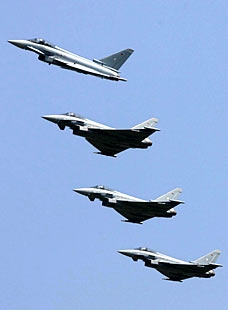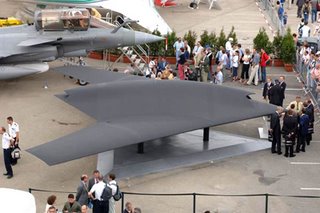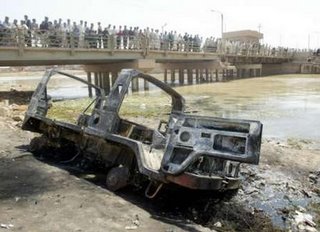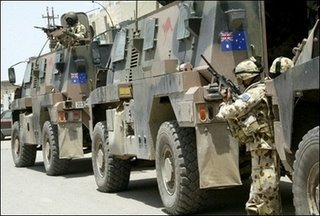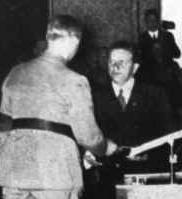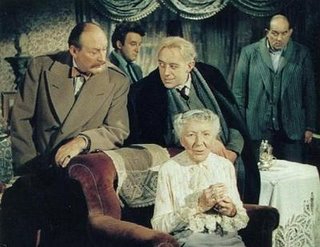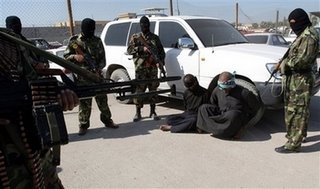 The last piece finished with a contradiction. At one, the implication of both pieces so far written is that the David Cameron and his Conservative Party want to win the next general election. But, in that second piece, I concluded that, for the Boy and his acolytes, winning the next general election was not their game. "They have bigger fish to fry," I wrote, "the total destruction of the Conservative Party."
The last piece finished with a contradiction. At one, the implication of both pieces so far written is that the David Cameron and his Conservative Party want to win the next general election. But, in that second piece, I concluded that, for the Boy and his acolytes, winning the next general election was not their game. "They have bigger fish to fry," I wrote, "the total destruction of the Conservative Party."This contradiction comes with the territory that is politics. In any major party and even (or especially) in the small ones, there are major differences of opinion, mixed motivations and variations in tactics. There is no single view or orthodoxy that will prevail for all time or any length of time. "Shifting sands" hardly does justice to the way sentiment changes within a political party – you can be "in" – flavour of the moment – and seconds later you can be "out", as fashion changes. Nothing is quite so brutal as politics.
Back to the main point then… the Boy does want to win and the Party desperately, desperately yearns to win. It hates being in opposition, has no talent for it and no understanding of the street-fighting needed to claw the party back into power. But the Boy and the Party are not at one.
The Boy wants power, but he believes the only way he will get it is to change the Conservative Party beyond all recognition. He believes that only then will the electorate (the bit left of it that is still prepared to vote) come round to voting for him. At some point though, the Party will have been so changed that it will have ceased to be the Conservative Party in anything else but name – it will have been destroyed. And since that is a precondition of victory - in the mind of the Boy and many of his tight circle of acolytes – the destruction of the Party is their first priority. Only then will it be fit to win and if that means losing the election, in order to win the next, so be it.
But there are darker forces within the Boy's circle – some people (and the cognoscenti know who they are) who want to destroy the Conservative Party as an entity – by which they mean the "right wing" which is naturally liberal, free-thinking and, crucially, Atlanticist and anti-EU. A failure – the fourth in a row – to win could be put down to the Party being dragged down by its right wing, providing the legitimisation for a "night of the long knives", followed perhaps by a re-alignment with the Lib-Dems to create a centre left, anti-American, pro-EU party.
In that scenario, the great battles are yet to come and will be fought out, for the soul of the Party, only after the next election has been lost – an outcome actively desired by many within the senior ranks of the Party.
In politics as elsewhere, however, it is possible to hold two contradictory ideas simultaneously. The Boy, therefore, might actually want to lose the election – but he also wants to win it. At the very least, he must be seen to be making a good fist of a campaign, not least so that any failure can be blamed on the "right-wing".
 However, he and his inner circle believe they can run a campaign centrally, relying on heavy money from sponsors and the money men. The key strategy is to build the Cameron persona into an A-list celebrity that will pull in the voters in a latter-day "Big Brother" style contest, where personalities rather than policies - and therefore politics - become the key issue.
However, he and his inner circle believe they can run a campaign centrally, relying on heavy money from sponsors and the money men. The key strategy is to build the Cameron persona into an A-list celebrity that will pull in the voters in a latter-day "Big Brother" style contest, where personalities rather than policies - and therefore politics - become the key issue.Hence the latest party political broadcast, where we are invited to "check out David's new video…". Yuk and double-Yuk! This, from the leader of the Conservative Party? It is an invitation so puerile as to be calculated to engender nausea. In effect, the Boy wants you to vote Brown out of the House, to leave him with the prize.
It is that facile, policy-lite approach which inspired the title to these pieces - "the retreat from politics". The Boy is not interested in politics. He is simply interested in power and, to obtain it, he is seeking to turn the election into a beauty contest.
As for the rest – current MPs and the candidates – these fall into one of two groups. The first is those who are motivated by a sense of outrage, people who get into politics because they think the system needs controlling and changing - who think that peole should come first. The other group comprises those who enjoy the use of power – and the trappings that go with it – for its own sake. Sadly, the latter are more numerous and, as the power drains away to the EU and elsewhere, the trappings assume greater and greater importance to them.
The trouble with these power-mongers in opposition is that they are not prepared to work for power. They assume it is theirs by right and harbour not a little resentment that they are in opposition. There is neither humility nor modesty in the mid-ranking hierarchy.
 Furthermore, it is their arrogance of office that will be their undoing. It was there in the dying days of the Major government, coupled with a smug condescension that made them impervious to any new ideas or information. Simply, you could not tell them anything, as they already knew it all and would reward you with a pitying smile if you had the temerity to suggest that there was something that they might not know or understand.
Furthermore, it is their arrogance of office that will be their undoing. It was there in the dying days of the Major government, coupled with a smug condescension that made them impervious to any new ideas or information. Simply, you could not tell them anything, as they already knew it all and would reward you with a pitying smile if you had the temerity to suggest that there was something that they might not know or understand.If there is a personal edge to this bit of analysis, it stems in part from dealing with the last Conservative government's attempts to mount a deregulation campaign. It was doomed from the very start as ministers were relying on civil servants to tell them where and how to cut back regulation – the very civil servants who were largely responsible for the mess. But you could tell them nothing.
The experience, however, is shared by others. Talking to a very senior general, now retired, he recalled how he had offered his services freely to the Party to help them construct an effective defence policy. All they had to do was 'phone me, he said. But, after the first meeting, the call never came. He was never asked – and to this day has not been asked – for any help or information.
Thus, we have the upper levels of the Party, the inner circle around the Boy, who believe the election can be run as a policy-free beauty contest. In the middle ranks, we have a huge tranche of unreconstructed careerists, "Tory Boys" of all ages, who display an infuriating arrogance that alienates most of those who seek to help them into office.
At the lower echelons, we have party members who are so anxious to win that they will believe anything – even, and especially, that the Boy is a winner. For that, they will suspend judgement and put their local electoral machines into action. But many will not. They can see though the Boy, his posturing and pretensions. Some – a few – are resigning with a great flourish, but many more are simply walking away, disgusted and ashamed to see how a once great party has declined. They are the activists, the core voters – and they are not going to support the Boy.
If ever there was a losing recipe, that is it.
So, towards the end of a long piece, some readers might consider this analysis an intrusion on private grief – the affairs of an opposition party in a small country anchored just off mainland Europe, a party that has not seen power for over nine years and is unlikely to see it for many more.
But we are a country that is the staunchest ally to the US in the war of terror. Its current prime minister, Tony Blair - for all his ambitions to be at the heart of Europe - has managed to keep the UK alongside the US and has committed troops (but not properly supported them) in important theatres, alongside US troops.
 But the Blair reign is about to end. Replacing him, almost certainly, will be Gordon Brown. And for all his familiarity, no one actually knows his politics, what he stands for and where he will take us on a whole range of issues, from the war on terror to EU membership. And, if he fails to perform, it becomes even more vital that we have a strong, credible opposition with a leader who is perceived as a credible prime minister, who could take the incumbent's place.
But the Blair reign is about to end. Replacing him, almost certainly, will be Gordon Brown. And for all his familiarity, no one actually knows his politics, what he stands for and where he will take us on a whole range of issues, from the war on terror to EU membership. And, if he fails to perform, it becomes even more vital that we have a strong, credible opposition with a leader who is perceived as a credible prime minister, who could take the incumbent's place.In what may turn out to be a modern tragedy though, the opposition is the "not-the-Conservative-Party". The man who would be prime minister is David Cameron, a man who never really looked like a credible candidate and looks less so with each passing day. He has made the retreat from politics his guiding principle and it now looks as if politics is going to retreat from him and (what is left of) his party. The price we will all pay for that is Gordon Brown as prime minister for the foreseeable future.
Where that will take us, in an age of uncertainty, no-one knows - but better the devil you don't know than the one you do.
COMMENT THREAD





